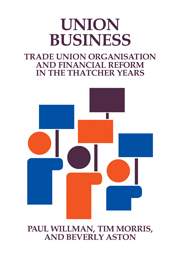Book contents
- Frontmatter
- Contents
- Acknowledgements
- 1 Introduction: unions in the 1980s
- 2 The financial status of British trade unions 1950–1989
- 3 Financial differences between unions
- 4 The role of financial matters in union organisation
- 5 The politics of union finaces
- 6 Union size, growth, and financial performance
- 7 Strike activity and union finances
- 8 The National Union of Mineworkers: strikes and financial disaster
- 9 The GMB: merger and financial reform
- 10 The Amalgamated Engineering Union: back from the brink
- 11 The Banking, Insurance and Finance Union: competitive unionism and financial survival
- 12 The Electrical, Electronic, Telecommunications and Plumbing Trade Union: accountability and financial control
- 13 Conclusions: union business and business unionism
- Appendix 1 Research methods
- Appendix 2 Regression results
- Appendix 3 Questions for finance officers
- Appendix 4 Questions for General Secretaries
- Appendix 5 Questionnaire: trade union finances
- Appendix 6 The number of trade unions
- Notes
- References
- Subject index
- Index of trade unions
- Author index
13 - Conclusions: union business and business unionism
Published online by Cambridge University Press: 11 March 2010
- Frontmatter
- Contents
- Acknowledgements
- 1 Introduction: unions in the 1980s
- 2 The financial status of British trade unions 1950–1989
- 3 Financial differences between unions
- 4 The role of financial matters in union organisation
- 5 The politics of union finaces
- 6 Union size, growth, and financial performance
- 7 Strike activity and union finances
- 8 The National Union of Mineworkers: strikes and financial disaster
- 9 The GMB: merger and financial reform
- 10 The Amalgamated Engineering Union: back from the brink
- 11 The Banking, Insurance and Finance Union: competitive unionism and financial survival
- 12 The Electrical, Electronic, Telecommunications and Plumbing Trade Union: accountability and financial control
- 13 Conclusions: union business and business unionism
- Appendix 1 Research methods
- Appendix 2 Regression results
- Appendix 3 Questions for finance officers
- Appendix 4 Questions for General Secretaries
- Appendix 5 Questionnaire: trade union finances
- Appendix 6 The number of trade unions
- Notes
- References
- Subject index
- Index of trade unions
- Author index
Summary
Introduction
We set ourselves the task of analysing changes in trade unions in the period 1980–9, from a particular perspective. We were concerned to look at financial matters and the internal management systems of unions, rather than, for example, union democracy or bargaining behaviour. We were also concerned to focus on formal union organisation rather than on shop steward networks. Our account is thus by no means a comprehensive picture of change. Nevertheless, we feel that there are some general points about change in trade unions to be made on the basis of our analysis, and they are detailed below. In essence, we shall argue that the changes we have documented are related to more deep seated changes in union organisation and behaviour. Financial variables have responded to broader changes both within the trade union movement and beyond: they have, in turn, influenced union policy responses to change throughout the decade. We shall outline this argument in detail below and assess its implications. However, at the outset it is useful to summarise the empirical work.
Summary
Trade unions are not primarily economic organisations and they do not seek in general to maximise financial performance. Nevertheless, they require a certain level of financial resources to survive and to grow. So much was recognised by the Webbs (1907), but many more recent studies have failed to consider financial matters when explaining union behaviour, and no detailed conceptualisation or analysis exists of the financial subsystems of trade unions.
- Type
- Chapter
- Information
- Union BusinessTrade Union Organisation and Financial Reform in the Thatcher Years, pp. 199 - 216Publisher: Cambridge University PressPrint publication year: 1993



